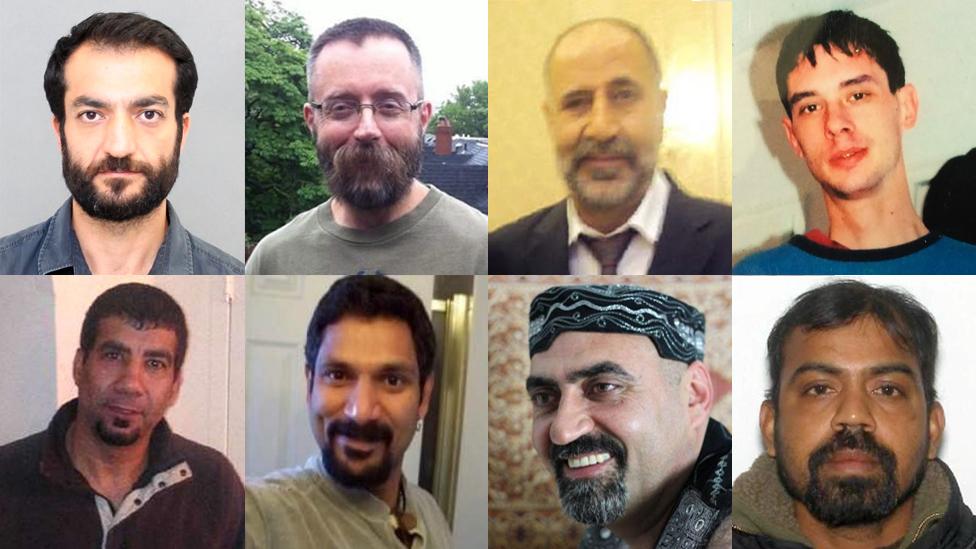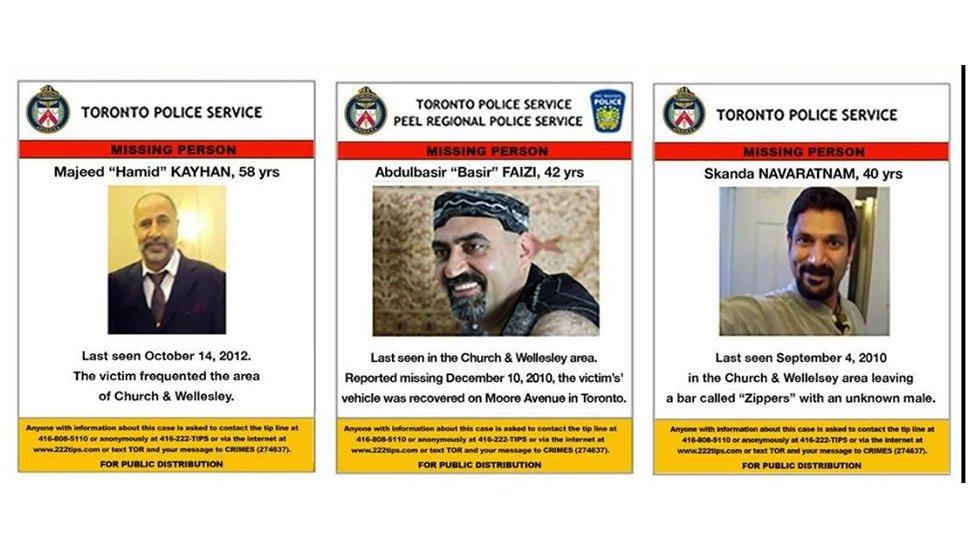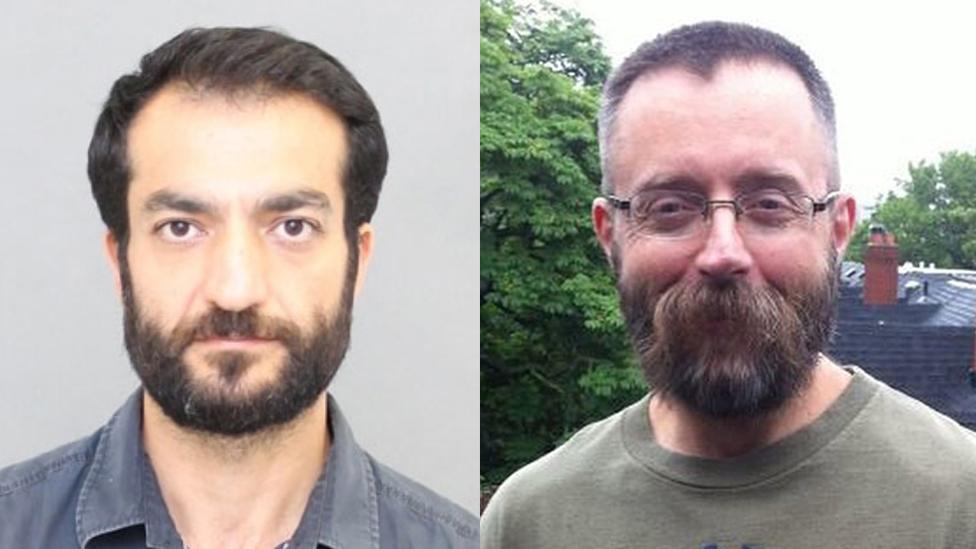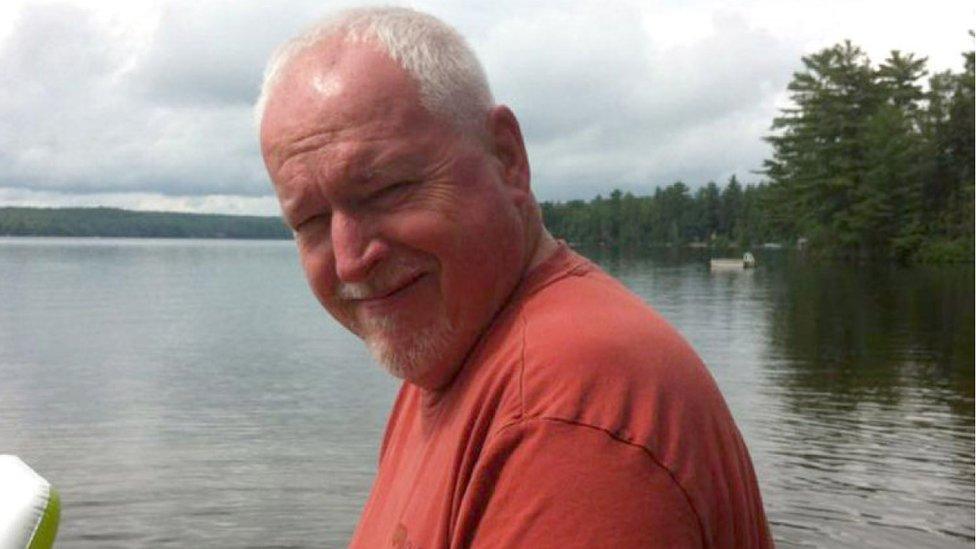Bruce McArthur: Who were Toronto serial killer's victims?
- Published

Clockwise from upper left: Selim Esen, Andrew Kinsman, Majeed Kayhan, Dean Lisowick, Kirushna Kumar Kanagaratnam, Abdulbasir Faizi, Skandaraj Navaratnam, Soroush Mahmudi
A Canadian landscaper has pleaded guilty to killing eight men who went missing between 2010-17 in Toronto.
Bruce McArthur, 67, was arrested last January and charged in the deaths of two men. Police subsequently charged him in six other cases as they continued to uncover evidence in their investigation.
Many of his victims were immigrants or refugees from South Asia or the Middle East, coming from Afghanistan, Turkey, Sri Lanka and Iran. Many were also marginalised in some way, either because of their sexuality or because of homelessness or substance abuse. Most had ties to Toronto's Gay Village.
Who were McArthur's eight victims?
Skandaraj Navaratnam, 40
Navaratnam was McArthur's first victim. The 40-year-old had moved to Canada from Sri Lanka in the 1990s as a refugee and settled into life in the city's Gay Village.
He has been described as someone who was very social and jovial, and always ready to help out his friends.
One friend said he an educated and curious man with a strong interest in global affairs and who was "unbeatable at Scrabble".
"His laugh was just ridiculous," Jodi Becker, a bartender at Zipperz and close friend of Navaratnam's, told the Toronto Star after he went missing, external. "If Skanda started laughing, everybody started laughing, even if nothing was funny."
When he disappeared in September 2010, abandoning a new puppy alone in his apartment, his friends called police.
According to court documents, police found a silver bracelet belonging to Navaratnam in McArthur's bedroom during their investigation.
Navaratnam knew McArthur since the early 2000s, and they had dated.
Abdulbasir Faizi, 42
Faizi's disappearance in December 2010, along with that of Navaratnam and Majeed Kayhan, who went missing in 2012, prompted Toronto police to launch missing persons task force Project Houston, which was shuttered after 18 months.
Faizi was married and a father of two. He divided his life between the Toronto suburb of Brampton where he lived and his social life in the Gay Village downtown.
His family reported him missing, but because they didn't know his ties to the Village, his disappearance largely flew under the radar of Toronto's LGBT community.
During McArthur's sentencing hearing, his wife said in a statement that his daughters, who were aged six and 10 when he disappeared, often still cry for their father. She said she is struggling to support the family.
Faizi's car was found abandoned "near a home that Mr McArthur had access to at the time of the killing", court documents state.

Project Houston
Majeed Kayhan, 58
Like Faizi, Kayhan was believed to have led two separate lives - one with his family and one in the Village.
Kayhan was an Afghan immigrant and the youngest of many siblings. He had a wife and children and also frequented many of the bars in the Village and kept an apartment in the area. His adult son reported him missing in the autumn of 2012 when he could no longer reach him.
McArthur told police that he had employed him as a landscaper helper, and claimed to have had a brief sexual relationship with him.
"I still have not comprehended how this crime happened. It has consumed the majority of my thoughts," his brother told the court in February.
Police believe Kayhan was killed around 18 October 2012.
Soroush Mahmudi, 50
Mahmudi was a refugee from Iran and reported missing by his wife.
In a statement to the court, she called him her "soul mate" and said she has been overwhelmed by grief at his brutal slaying.
Police believe Mahmudi was killed in August 2015 and found a coat with his DNA on it in McArthur's van during their investigation.
Kirushna Kumar Kanagaratnam, 37
The 37-year-old is came to Canada on the MV Sun Sea in 2010, a ship carrying almost 500 Sri Lankan asylum seekers that arrived in Canadian waters that summer.
His refugee claim was denied and he was ordered to be deported. Police and family did not report him missing because they assumed he was in hiding.
Kanagaratnam was close with his family, and talked to them regularly, the court heard. Family members described in court statements the shock and pain they felt upon learning of his fate.
Police have said it is not clear how Kanagaratnam came into contact with McArthur given he had no clear ties to Toronto's Village.
Evidence suggests he was killed in January 2016.
Dean Lisowick, 47
Lisowick was McArthur's sixth victim, but unlike the others killed by McArthur, he was never reported missing to police.
The 47-year-old was often found staying in homeless shelters in Toronto and worked in the sex trade.
In a statement read in court, his daughter said: "I will always have to live with knowing that I will never have a relationship with my father".
His cousin told the court he that his face "lit up" when he spoke about his daughter and that he hoped to get his life together so he could do more for her.
He also kept in touch with his parents until his struggles with mental illness landed him on the streets. But his uncle told the court that even then he would still occasionally send cards to his mother that had been "searched out carefully for their expressions of love".
"He was a loving and caring man," his uncle Gerry Montanti said. "He was not alone in the world."
His name was added in February 2018 to Toronto Homeless Memorial, which remembers those who have died as a result of homelessness in the city.
He is believed to have been killed sometime around late April 2016.
McArthur kept some of Lisowick's jewelry, which police later found in his apartment, according to court documents.

Police are investigating the murders of Selim Esen, left, and Andrew Kinsman
Selim Esen, 44
Originally from Turkey, Esen came to Canada in 2013. He disappeared from his home near the Village in April 2017.
"He was very friendly, kind hearted, open, independent-minded and curious, passionate about learning new things, gardening, exploring new places and meeting new people," Esen's brothers said in a family statement in June, external.
"His tender and kind humanity came before everything else."
The court heard in February that Esen spoke to his best friend every day, and when he did not reply to a text his friend reported him missing.
Esen had struggled in the past with substance abuse, but friends told the court during McArthur's sentencing hearing that he had reached a turning point and hoped to help others in their recovery.
He was described as a nature lover who enjoyed managing a cafe, who had a passion for sociology and philosophy, and who was generous and selfless with his friends.
Many told the court they are still struggling to come to terms with his murder.
McArthur kept a notebook owned by Esen, which police later found in the serial killer's apartment.
Andrew Kinsman, 49
The first two charges laid against McArthur by police was for the murders of Kinsman and Esen.
It was Kinsman's disappearance in June 2017 that sparked a community-wide search and rekindled rumours of a serial killer in the Gay Village.
Kinsman was active in the city's LGBT community, and friends hung posters of the missing 49-year-old around the Village and nearby Cabbagetown when he went missing.
Soon after, police launched a task force, Project Prism, to investigate his and Esen's disappearance.
"He wanted to make the world a better place for those struggling to survive," his sister Karen Coles told the court in February.
His sister described him as someone who, under his "gruff demeanour", cared deeply about other people and who championed social justice issues - "an extraordinary, quirky and caring individual".
Police believe Kinsman was sexually involved with McArthur and they found the entry "Bruce" in Kinsman's diary on June 26, 2017, the day police believe he was killed.
- Published16 April 2018

- Published11 April 2018

- Published8 February 2018
